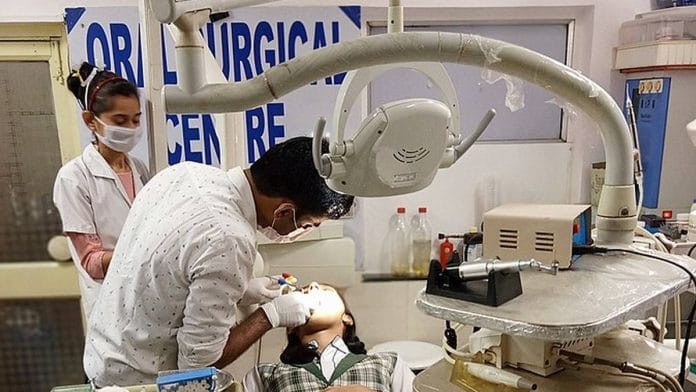With the Union Budget just days away, the government’s healthcare vision for the current financial year will soon be revealed. Since Covid-19, public health has been receiving much-needed attention, but one of its key components has consistently escaped the attention of policymakers over the years: oral health.
Though they are largely preventable, oral diseases are a global health burden impacting the physical, emotional, mental, and social well-being of those affected. Recognising this, the WHO World Health Assembly adopted a resolution in 2021 to integrate oral health into the noncommunicable disease (NCD) agenda and universal health coverage (UHC). This shift calls for a move from curative to preventive oral healthcare.
Oral health is linked to Sustainable Development Goals (SDGs) such as good health and well-being, reducing inequalities, and promoting economic growth. But there are significant disparities in oral health worldwide, with low- and middle-income countries facing higher burdens due to limited access to dental care, inadequate policies, and low public awareness.
Organisations like the WHO and the International Dental Federation (FDI) work to address these issues by promoting oral health education, advocating for better policies, and supporting research and innovation.
However, much needs to be done for integrating oral health into general health policies, improving access to affordable dental care, and targeting high-risk populations in developing regions.
To fill these gaps in India, following a public-private partnership (PPP) model could go a long way.
Also Read: Budget 2024 must further India’s clean energy goals. Climate change is an economic problem
India’s oral health burden
Oral diseases are among the most common globally, according to the WHO, affecting about 3.5 billion people. The incidence of oral diseases has increased significantly, outpacing population growth, with poor and disadvantaged populations bearing the highest burden. Worldwide, 60-90 per cent of school-going children and nearly all adults have at least one dental cavity. Severe gum disease affects 15-20 per cent of adults aged 35 to 44, and about 30 per cent of people aged 65 to 74 have lost all their natural teeth.
In India, a substantial portion of the population grapples with oral health issues. Per the WHO’s latest fact-sheet, citing figures from 2019, 43.3 per cent of children aged 1-9 suffer from untreated caries of their primary teeth. For permanent teeth, the prevalence of untreated caries is 28 per cent in people aged over 5. In addition, severe periodontal (gum) disease affects 21 per cent of people aged 15+, and edentulism—the loss of teeth— has a prevalence of 4 per cent in the 20+ population.
Government expenditure on public health in India is around 2.1 per cent of GDP. Despite a focus on preventive healthcare, oral health has yet to be adequately recognised in public policy. This even though it significantly impacts systemic health, quality of life, and economic productivity.
Oral hygiene not only helps prevent dental caries and periodontal diseases, but impacts overall health. Poor oral hygiene is linked to cardiovascular diseases, diabetes, respiratory infections, and adverse pregnancy outcomes. For example, chronic inflammation from gum disease can contribute to cardiovascular diseases, and poor oral health can complicate diabetes management. Oral bacteria can also lead to respiratory infections, particularly in vulnerable populations like the elderly.
Poor oral hygiene has significant economic implications too, including direct costs of dental treatments and indirect costs related to lost productivity due to dental issues.
Oral health has received low priority in India and other developing countries due to limited resources, competing health priorities, lack of awareness, insufficient workforce, inadequate infrastructure, cultural beliefs, and policy gaps. Governments prioritise immediate life-threatening conditions over preventive and chronic conditions like oral health. Low awareness about the connection between oral health and overall health further reduces demand for oral health services. A lack of access to trained dental professionals and infrastructure exacerbates the issue.
To counter this, investing in preventive measures such as community water fluoridation can reduce the need for dental treatments and lead to substantial cost savings.
Other effective strategies include raising awareness through school programmes, community workshops, and media campaigns; ensuring affordable dental care for underserved communities; implementing school-based oral health initiatives; and establishing clinics in underserved areas. Mobile dental units can also reach remote populations.
Also Read: InvITs—a made-in-India solution for financing the green transition
How PPPs can help
Public-private partnerships (PPPs) can enhance oral public health, especially with limited public funding. Private sector investment can supplement public resources, leading to the construction of dental clinics, provision of modern equipment, and extension of dental services to rural and marginalised communities. PPPs can also improve the training of dental professionals, introduce innovative technologies like tele-dentistry, and drive research in oral health. Joint efforts can raise awareness about oral hygiene and advocate for policies promoting oral health.
Additionally, PPPs can facilitate better data collection and sharing, enabling effective monitoring and evaluation of oral health programmes. They ensure accountability and transparency in resource use and program implementation. By leveraging public and private sector strengths, PPPs can significantly improve inclusive oral public health, providing quality dental care for underserved populations.
However, this would require a well-crafted framework, including service level standards, pricing (to be paid by the government), transparency in contracting, and performance enforcement.
Oral hygiene is vital for public health, impacting overall health, quality of life, and economic productivity. Public health initiatives promoting oral hygiene can lead to significant health improvements and cost savings. Addressing financial constraints, competing health priorities, lack of awareness, workforce shortages, inadequate policies, and cultural beliefs can elevate oral health in the public health agenda.
Investing in oral health fosters a healthier, more equitable world. Perhaps this year’s Budget could start this process.
Dr Arvind Mayaram is a former finance secretary in the Government of India and the chairman of the Institute of Development Studies Jaipur, India
Dr Gowher Hafiz is a Dental Surgeon in Srinagar, J&K, India
(Edited by Asavari Singh)






